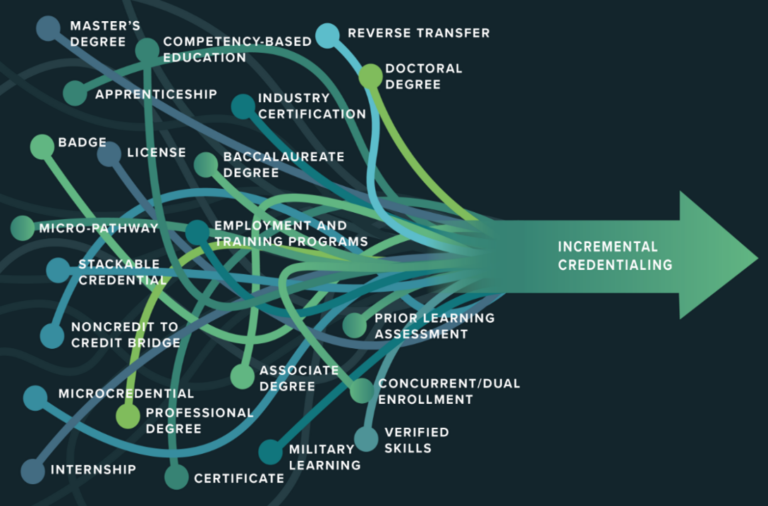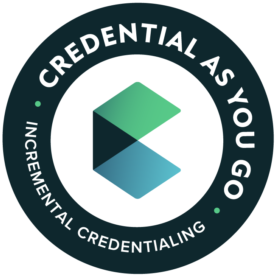Credential As You Go calls for a nationally recognized system of incremental credentialing. Such a system would capture and validate all learning, thus enabling individuals to be recognized for what they know and can do via many types of credentials.
The U.S. needs a fair and inclusive postsecondary system, one that captures and validates all types of valuable learning. Incremental credentialing is one approach toward building such a system – one in which the educational pathways offered by higher education institutions lead to transferable and usable qualifications for employment and further education. In such a system:
Although incremental credentialing is not new, it is not inherent to the design of the U.S. learn-and-work ecosystem. Still, experts in the ecosystem are increasingly calling for the growing number of valuable credentials — degree and non-degree — to be organized into a coherent system. This requires redesigning of credentialing systems across states and higher education institutions. Such redesigns are necessary to reduce confusion, increase learning recognition, and integrate what people know and can do.
Incremental credentialing does not aim to disrupt the existing benefits of higher education. Rather, its goal is to help institutions lessen confusion – among learners and employers – about the value of all credentials, including degrees. It strives to enhance learning recognition and enable the integration of learners’ knowledge and skills into qualifications that support employment and further education.
Incremental Credentials capture learning as it is acquired along the learning pathway and formally recognizes and connects that learning to a larger context. Incremental credentials can be non-credit or credit-bearing; undergraduate or graduate level; of any size, from small units of learning up through degrees. The purpose of incremental credentials is to ensure learners are recognized for what they know and can do as they acquire the learning and not leave learners without formal documentation of that learning.
Definitions & Use of Key Terms & Concepts in Incremental Credentialing
Incremental credentials refer to all types of credentials that formally document learning, including certificates, badges, microcredentials, academic degrees, apprenticeships, licenses, and other non-degree credentials. Incremental credentials can be noncredit or credit-bearing; undergraduate and graduate level in higher education or at any level in industry; and any size, from small units of learning through degrees. Incremental credentials can:

Many credential providers issue a variety of credentials upon program completion, ranging from trade schools to post-doctoral institutions. Regardless of credential type, incremental credentials capture learning acquired along the learning pathway, and formally recognize and connect that learning to a larger context of work and schooling.

Credential As You Go has acquired three phases of funding to date. Lumina Foundation funded Phase I, resulting in the Incremental Credential Framework for testing. The Institute of Education Sciences, U.S. Department of Education funds Phase II (Grant R305T210063), which focuses on rapid prototyping of and research on incremental credentials with a national campaign. An anonymous private donor fund at the Program on Skills, Credentials & Workforce Policy at George Washington University funds the development of the prototype Learn and Work Ecosystem Library. Walmart funds Phase III, which focuses on systems change for expansion and sustainability of incremental credentials. The opinions expressed are those of the authors and do not represent views of Lumina Foundation, Institute of Education Sciences, the U.S. Department of Education, Walmart, or George Washington University.